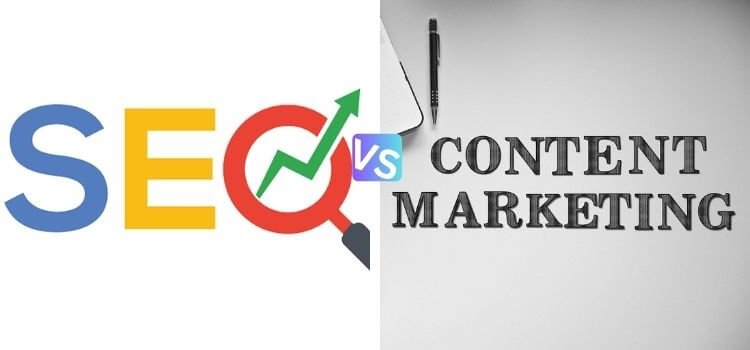Building an online presence can feel overwhelming with so many strategies to choose from. Two approaches often stand out: SEO (Search Engine Optimization) and Content Marketing. It’s not always clear which one is the right fit. SEO focuses on improving website visibility on search engines like Google, while Content Marketing emphasizes creating valuable content that builds trust with an audience.
Recognizing the differences between these two strategies helps businesses make smarter choices. In this guide, I will share tips and lessons about SEO vs. Content Marketing, showing how both can work together to boost traffic, build trust, and grow online success. Let’s start, so keep reading!
Table of Contents
What is SEO?
Think of SEO as trying to impress Google. When you optimize your website for search engines, it’s like saying, “Hey, Google, pick me!” SEO involves making sure your website:
- Has the right keywords (words people search for).
- Loads quickly.
- Works well on mobile devices.
- Has high-quality backlinks (links from other websites).
SEO is not just about adding keywords but about creating a great user experience. For example, Google prioritizes websites that are fast, secure, and mobile-friendly. This means SEO is about both content and technical performance. A well-optimized site not only attracts visitors but also keeps them engaged by providing relevant, high-quality content. When users find what they’re looking for quickly and easily, they’re more likely to return, which further boosts your ranking.
Did you know? 93% of online experiences start with a search engine. This shows how important SEO is!

How Does SEO Work?
SEO works through algorithms. Search engines like Google scan websites and decide which ones deserve to be at the top of the results. These algorithms look for:
- Relevant keywords.
- High-quality content.
- User engagement (like how long visitors stay on your page).
- Technical performance (like website speed and mobile-friendliness).
It’s like a game of trust. The more reliable your website looks, the better your chances. Building this trust takes time and effort, but the rewards are worth it. Over time, a strong SEO strategy can transform your website into a magnet for potential customers.
What is Content Marketing?
Content marketing is about creating valuable information for your audience. It’s not about directly selling but helping and educating. Here are some examples:
- Writing blogs.
- Making videos.
- Sharing social media posts.
- Sending helpful emails.
Content marketing focuses on building relationships. Instead of saying, “Buy this,” it says, “Here’s something that will help you.” By providing useful information, you build trust and loyalty. This approach not only attracts new customers but also keeps your existing ones engaged. The more value you provide, the more likely people are to recommend your business to others.

In 2024, 70% of marketers reported using content marketing to attract customers. Why? Because it works! People appreciate brands that provide genuine value without expecting immediate returns.
Types of Content Marketing
Content marketing comes in many forms:
- Blogs: Informative articles that solve problems.
- Videos: Engaging and easy-to-digest content.
- E-books: In-depth guides on specific topics.
- Social Media: Quick, shareable posts.
- Podcasts: Audio content that informs and entertains.
Each type serves a purpose. Together, they create a strategy that keeps your audience coming back for more. Whether it’s a how-to guide, a funny video, or an inspirational story, content marketing offers endless possibilities to connect with your audience.
SEO vs. Content Marketing: Main Differences
Here’s a simple comparison:
| Feature | SEO | Content Marketing |
|---|---|---|
| Focus | Search engine ranking | Audience engagement |
| Time to See Results | 3-6 months | Can be immediate |
| Cost | Medium to high (tools/services) | Low to medium (writing costs) |
| Main Goal | Drive organic traffic | Build trust and educate |
| Longevity | Long-term | Medium to long-term |
SEO is like the foundation of a house—it ensures stability. Content marketing is like the furniture—it makes people want to stay. Together, they create a winning combination. By combining SEO with content marketing, you ensure your house not only stands strong but also feels inviting. This synergy is key to sustained online success.
SEO and Content Marketing
When I started my first blog, I didn’t understand SEO. I wrote articles but got little traffic. After learning about keywords and optimizing my site, my traffic increased by 300% in just 6 months. It was like flipping a switch. Suddenly, people were finding my content, and it felt amazing.
At the same time, I started creating helpful guides for my readers. One article titled, “How to Start a Blog in 7 Steps,” brought in hundreds of readers. They trusted me because I was providing value. This is the magic of content marketing. People appreciated the effort I put into creating something useful, and many of them became loyal followers.
One of my favourite moments was when a reader emailed me to say, “Your blog inspired me to start my own business.” That’s the power of combining SEO and content marketing—you don’t just attract people; you impact them. It’s not just about numbers; it’s about building real connections that last.

Why Not Use Both?
Here’s the secret: SEO and Content Marketing work best together.
- Use SEO to bring people to your website.
- Use content marketing to keep them there and turn them into customers.
For example, if you own a Bengali restaurant, you can:
- Optimize your website for keywords like “best Bengali food near me.”
- Write blogs like “The Secret Ingredients in Traditional Bengali Cuisine.”
By combining both strategies, you create a system that attracts and retains customers. This approach ensures that you’re not just getting visitors but building a loyal audience that keeps coming back.
Use analytics tools to track how people find your website. If SEO brings them in, and content keeps them engaged, you’re on the right track. This data-driven approach helps you refine your strategy and achieve even better results over time.
Pros and Cons
SEO Pros:
- Brings free traffic.
- Long-lasting results.
- Builds credibility.
SEO Cons:
- Takes time to see results.
- Can be expensive if you hire experts.
Content Marketing Pros:
- Builds trust.
- Engages your audience.
- Easy to start.
Content Marketing Cons:
- Requires consistent effort.
- Results can be slower without SEO.
Understanding these pros and cons can help you decide where to focus your energy and resources. It’s all about finding the right balance that works for your unique goals and challenges.
How to Decide: SEO or Content Marketing?
Ask yourself:
- What’s my goal? If you want quick traffic, focus on SEO. If you want to build trust, try content marketing.
- What’s my budget? SEO might require tools like Ahrefs or SEMrush ($99/month), but content marketing can start with just your time.
- Do I have patience? SEO is like planting a tree. Content marketing is like nurturing a garden. Both take time but are worth it.
A small business selling eco-friendly products used SEO to rank for “best eco-friendly products.” They also created content like “10 Tips for Living a Green Lifestyle.” The result? Their traffic doubled in a year, and their sales went up by 50%. This shows the incredible potential of combining these two strategies for long-term success.
Start Today
- Research Keywords: Use free tools like Google Keyword Planner.
- Create Valuable Content: Write blogs or make videos your audience will love.
- Optimize Your Content: Add keywords, make it mobile-friendly, and include meta descriptions.
- Track Your Progress: Use Google Analytics to see what works.
Tools to Help:
- For SEO: Ubersuggest, SEMrush, Moz.
- For Content Marketing: Canva, Grammarly, BuzzSumo.
Starting small is okay. The key is to be consistent and keep improving. Over time, even small efforts can lead to big results.
FAQs
Can I do SEO without content marketing?
Yes, but it’s less effective. Good content makes SEO easier.
Is content marketing better for small businesses?
Absolutely! It’s budget-friendly and helps build trust.
How long does it take to see results?
SEO takes 3-6 months. Content marketing can be faster if done well.
Do I need expensive tools?
Not always. Many free tools can get you started, like Google Analytics and Canva.
What’s the biggest mistake beginners make?
Ignoring the balance between SEO and content. Both need to work together for the best results.
Final Thoughts
SEO and Content Marketing aren’t enemies. They’re like best friends working together to grow your business. Whether you’re just starting or looking to improve, the key is to stay consistent and keep learning. Success doesn’t happen overnight, but with the right strategy, it’s definitely within reach.
What do you think? Which strategy feels right for your business? Try both and see the amazing results for yourself!
Have you ever thought that SEO is like proposing to Google? You’re saying, “Please notice me!” And content marketing? It’s like building a relationship. Both are needed for a happy ending. When done right, it’s a match made in digital heaven.
This post contains affiliate links. I may earn a commission if you make a purchase through them, at no extra cost to you.







